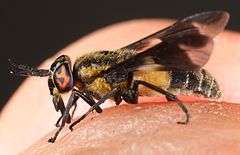Chrysops caecutiens
| Chrysops caecutiens | |
|---|---|
| | |
| Female of Chrysops caecutiens | |
_sucking_nectar.ogv.jpg) | |
| Male on Leucanthemum vulgare | |
| Scientific classification | |
| Kingdom: | Animalia |
| Phylum: | Arthropoda |
| Class: | Insecta |
| Order: | Diptera |
| Family: | Tabanidae |
| Genus: | Chrysops |
| Species: | C. caecutiens |
| Binomial name | |
| Chrysops caecutiens (Linnaeus, 1758) | |
| Synonyms | |
| |
Chrysops caecutiens, common name splayed deer fly, is a species of horse fly belonging to the family Tabanidae.[1]
Description
Chrysops caecutiens reaches a length of about 8.5–10 millimetres (0.33–0.39 in).[2] The mesonotum and the scutellum are glossy black with yellow-brown hairs. The compound eyes have red and green reflections, with dark spots. The transparent wings have dark brown patches, located at the top and at the centre of each wing. The abdomen shows distinct black inverted-V marking (hence the common name of "splayed" deer fly). The legs are black, included the tibiae on the middle pair of legs. They are active from May to September.[2]

Biology
The larvae of the splayed deer fly feed upon algae and organic matter in damp muddy soils.[2] The adult female flies feed on mammalia blood (including on Capreolus capreolus),[3] in order for their eggs to mature properly. When they bite, they inject saliva with an anti-coagulating agent that prevent the blood clotting. The structure of the ommatidia in the midregion of the eyes of the females of these bloodsucking flies could subserve high polarization assisting in host-finding.[4] Adult males and females feed also on nectar and pollen of flowers (mainly Leucanthemum vulgare).[2][3]
Distribution
This species is present in most of Europe, in the East Palearctic ecozone and in the Near East.[5]
Habitat
These horseflies preferably live in shaded marshlands and in damp woodlands.[2]
References
- ↑ Biolib
- 1 2 3 4 5 J.K. Lindsey Commanster
- 1 2 Global species
- ↑ Hansjörg Wunderer, Ulrich Smola Functional morphology of the retina of Chrysops caecutiens
- ↑ "Chrysops (Chrysops) caecutiens (Linnaeus, 1758)". 2.5. Fauna Europaea. July 23, 2012. Retrieved February 9, 2013.